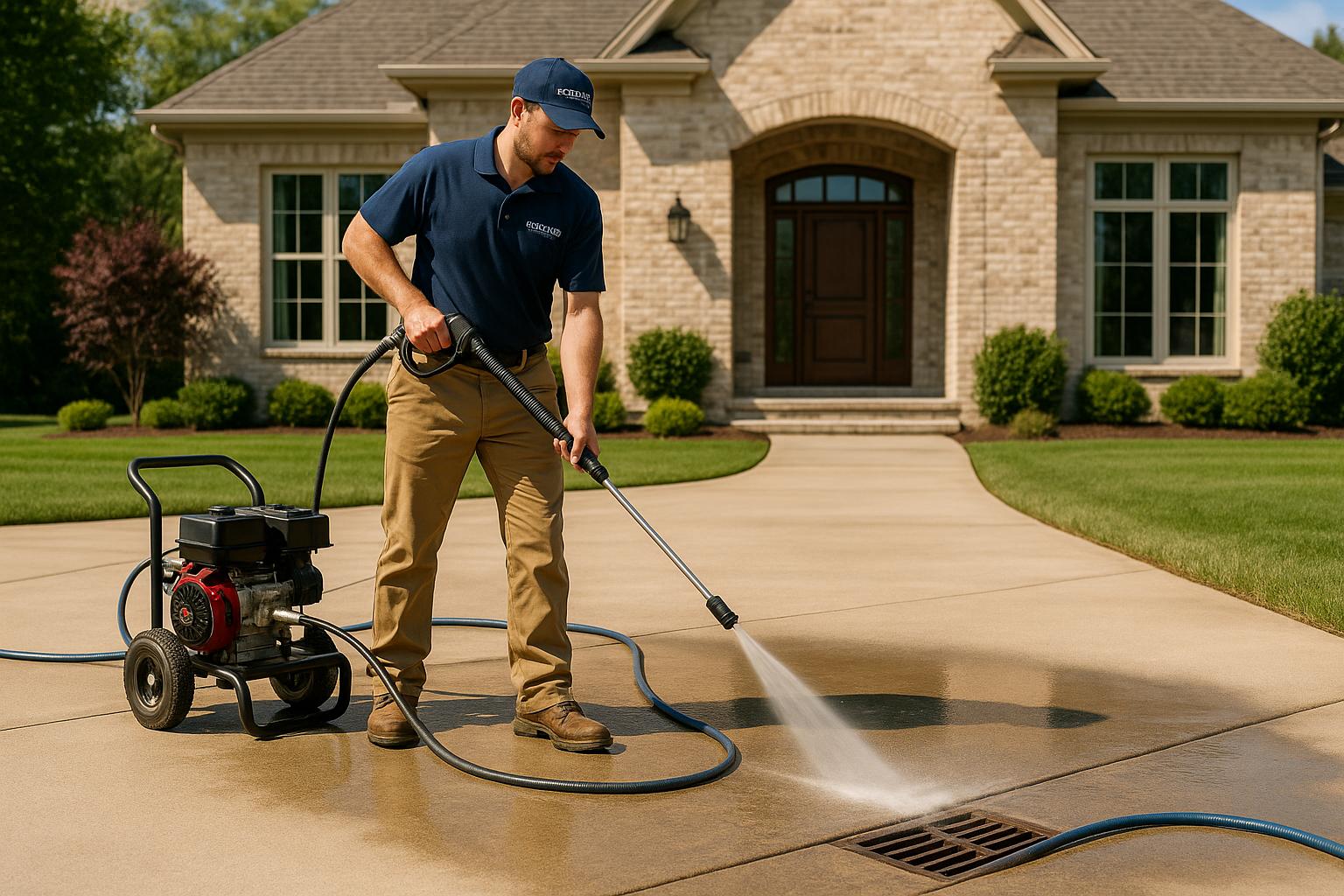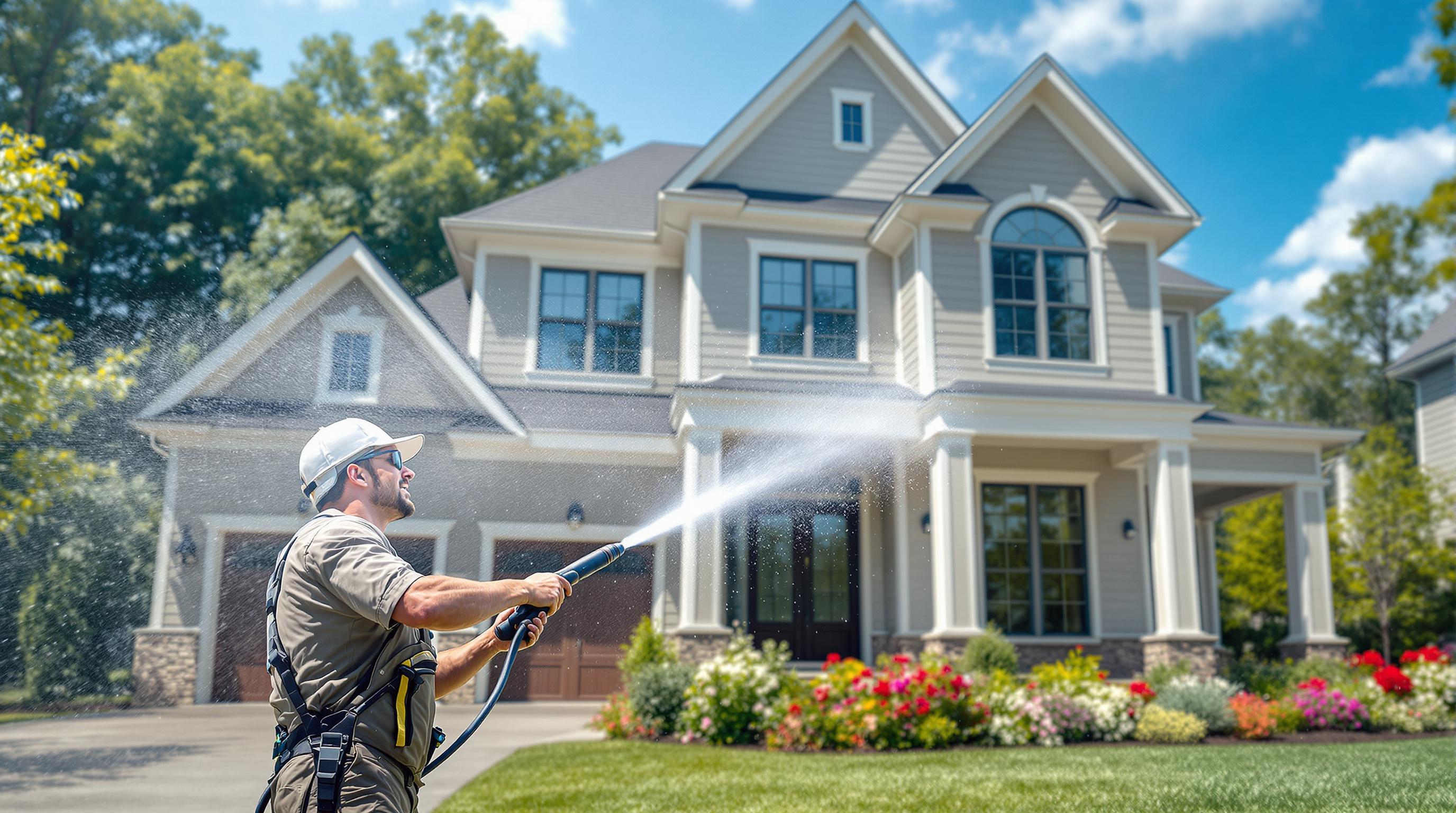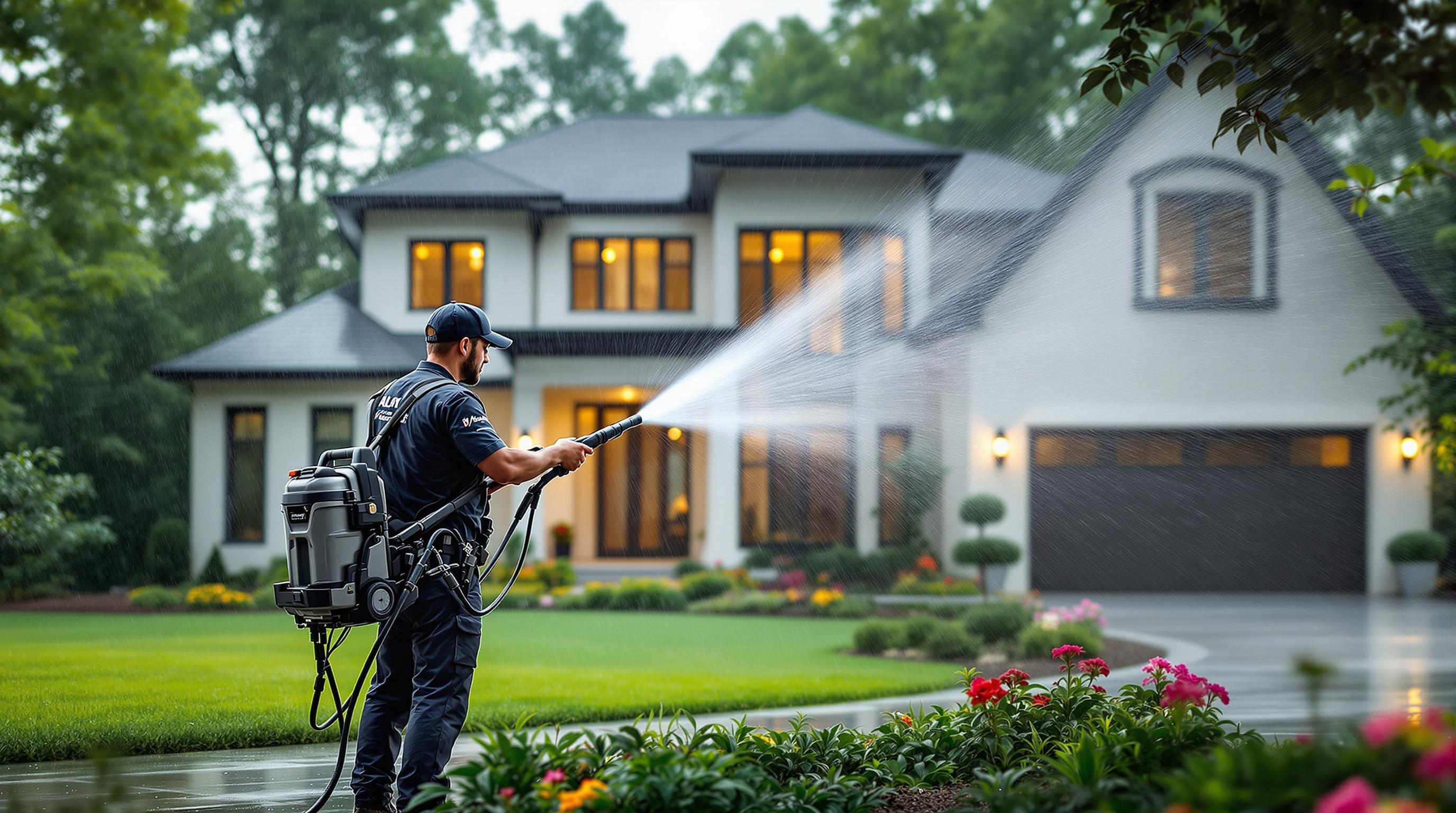Pressure washing runoff can harm the environment if not managed properly. Here's what you need to know about handling it responsibly:
- What is it? Wastewater from pressure washing often contains dirt, oils, cleaning agents, and other pollutants.
- Why it matters: Runoff can pollute local water systems, harming aquatic life and violating regulations like the Clean Water Act.
- How to manage it:
- Use tools like storm drain covers, berms, or vacuum systems to contain runoff.
- Dispose of wastewater safely in sanitary sewers, holding tanks, or approved facilities.
- Follow local laws and secure permits when necessary.
Key takeaway: Proper planning, containment, and disposal protect ecosystems and keep you compliant with the law. For complex jobs, professional services ensure everything is handled correctly.
What Makes Up Pressure Washing Runoff
Main Runoff Components
Pressure washing runoff is essentially a mix of water, cleaning agents, and debris, with the exact composition depending on the surface being cleaned. Here's a breakdown of its main components:
| Component | Source | Examples |
|---|---|---|
| Water | Pressure washer output | Water mixed with contaminants |
| Cleaning Agents | Detergents and soaps | Biodegradable or chemical cleaners |
| Debris | Material removed during cleaning | Dirt, dust, organic matter |
The type of surface being cleaned plays a big role in determining what ends up in the runoff. For example, cleaning a driveway might add oil stains, while washing a roof could include algae or moss.
Harmful Substances in Runoff
Sometimes, runoff contains substances that can be harmful if not handled properly. These might include:
- Motor oil and grease from vehicles or machinery
- Paint chips, especially from older surfaces that might contain lead
- Chemical residues left behind by certain cleaning products
To manage these risks, professional pressure washing services often use containment systems to capture and dispose of contaminated runoff safely. For instance, Pressure Washing Cary NC uses specialized equipment to prevent pollutants from entering local water supplies, ensuring proper disposal and environmental safety.
How To Recover Wash Water And Why It's Important
Planning Your Runoff Control
Managing runoff effectively is crucial to protect water systems and meet regulatory requirements. Proper planning ensures compliance and minimizes environmental impact during pressure washing projects.
Local Laws and Permits
Before starting, check local regulations and secure any necessary permits. Many municipalities have specific rules for handling wastewater. For example, Pressure Washing Cary NC adheres to local guidelines that focus on proper wastewater management. Always confirm requirements with local authorities to avoid issues.
Identifying Drainage Points
Conduct a site survey to pinpoint water flow paths and drainage points. This includes mapping storm drains, natural water routes, permeable surfaces, and property boundaries. Professionals often mark these routes and set up containment zones to keep runoff from entering waterways. Proper planning here helps in placing barriers effectively.
Guidelines for Property Owners
Once drainage routes are mapped, coordinate with property owners to finalize operational details:
- Access: Make sure water sources, electrical outlets, and disposal points are easily accessible. Remove obstacles and secure pets to ensure a safe working environment.
- Containment: Identify and set up collection zones away from areas like sensitive landscaping.
- Disposal: Get the property owner's approval for your runoff disposal plan to ensure alignment with their preferences and any local requirements.
Steps to Control Runoff
Managing runoff during pressure washing requires thorough preparation and the right tools. Here's a practical guide to handle wastewater effectively.
Pre-wash Clean-up
Start by clearing the area to minimize contaminants in the runoff. Use tools like brooms or blowers to remove loose debris. For heavily soiled areas:
- Sweep away dirt and debris.
- Absorb oil spots with appropriate materials.
- Check that gutters and downspouts are free from blockages.
Runoff Blocking Tools
Once the area is prepped, use containment tools to stop wastewater from spreading. Here are some common options:
| Equipment Type | Purpose | Best Use Case |
|---|---|---|
| Storm Drain Covers | Prevents water from entering drains | Flat areas like parking lots |
| Containment Berms | Forms temporary barriers for water | Large open spaces |
| Vacuum Systems | Collects and removes running water | Vertical surfaces |
| Filter Socks | Filters out sediment from runoff | Perimeters of properties |
Water Collection Methods
With barriers in place, focus on capturing the runoff effectively. Position collection devices at the lowest points where water flows. Use equipment like wet vacuums or pumps to actively gather water during the process.
Key methods include:
- Vacuum Recovery: Employ industrial wet vacuums capable of continuous operation to collect water efficiently.
- Pump Systems: Submersible pumps can move water from collection points to holding tanks for proper disposal.
- Containment Pools: Set up portable basins or pools in strategic spots to trap runoff.
For sloped surfaces, use berms or sandbags to guide water toward designated collection areas.
sbb-itb-8e2a680
How to Dispose of Runoff
Once you've collected runoff using proper control measures, it's essential to dispose of it responsibly and in line with local regulations.
Safe Disposal Options
Different disposal methods are available depending on the type of runoff. Here's a quick guide:
| Disposal Method | Best For | Requirements |
|---|---|---|
| Sanitary Sewer | Regular cleaning runoff | Municipal approval |
| Landscaped Areas | Chemical-free water | Permeable soil |
| Holding Tanks | Contaminated water | Professional disposal |
| Municipal Treatment | Large volumes | Pre-treatment required |
When using sanitary sewers, make sure the runoff is directed to the appropriate drain points - not storm drains. For landscaped areas, confirm that the soil can absorb the water without causing pooling or erosion. Special care is needed for hazardous runoff.
Dealing with Toxic Runoff
Toxic runoff, which may include substances like heavy metals, chemical cleaners, or paint residue, requires specialized handling. Common contaminants include:
- Heavy metals from industrial surfaces
- Chemical cleaning agents
- Paint residue
In these cases, you must use certified waste management services to ensure proper disposal. Avoid attempting to handle hazardous runoff without professional assistance.
Getting Disposal Permission
Before disposing of runoff, ensure you have all necessary permissions and permits. Here’s what you’ll need:
-
Property Owner Authorization
Secure written approval from the property owner for the disposal location, volume, and any restrictions. -
Municipal Permits
Check with your local water authority to determine requirements for sewer disposal. This may include water testing and discharge limits. -
Documentation Requirements
Keep records of disposal dates, locations, water test results, and any required approvals.
Professional pressure washing companies often have established relationships with local treatment facilities and maintain up-to-date disposal permits to ensure compliance. If you'd rather leave it to the experts, the team at Pressure Washing Cary NC follows all local guidelines to manage runoff safely and responsibly.
Following Local Rules
Following regulations is crucial to protect water systems and avoid fines.
Main Legal Rules
Pressure washing must adhere to federal, state, and local guidelines, including those under the Clean Water Act. Some key points to keep in mind:
- Storm Drain Protection: Prevent runoff from entering storm drains by complying with local rules.
- Containment Measures: Use tools like berms, barriers, or specialized equipment to manage runoff effectively.
- Proper Disposal: Ensure wastewater is directed to approved disposal facilities.
- Record Keeping: Maintain accurate records of disposal activities.
Property owners should also note that some states and municipalities may require permits for commercial pressure washing. These permits often outline approved methods for water collection, designated disposal locations, and may even require water quality testing.
These legal rules form the foundation for the standards professionals are expected to meet.
Professional Standards
Certified pressure washing professionals are equipped to ensure compliance with these regulations. Reliable companies typically offer:
- Valid Permits: They work with authorized disposal facilities.
- Insurance Coverage: Protection against environmental incidents.
- Advanced Equipment: Tools designed for effective containment and collection.
- Ongoing Training: Regular updates on best practices and regulatory changes.
Pressure Washing Cary NC takes a thorough approach to runoff management. Their process includes pre-job site assessments to identify risks, installation of high-quality containment systems, regular maintenance to prevent leaks or spills, detailed documentation of disposal activities, and staying current with local regulations.
Summary
Here’s a quick overview of the key practices discussed:
Managing runoff effectively helps protect local ecosystems and ensures compliance with regulations. This is achieved through careful planning, containment systems, and proper waste disposal methods.
Certified services play a crucial role by combining specialized equipment with approved disposal practices that meet federal and local standards. These methods help property owners make informed choices while staying compliant.
For effective cleaning and environmental protection, work with certified professionals who:
- Hold up-to-date permits and insurance
- Use specialized containment tools
- Adhere to approved disposal methods
- Keep detailed records of runoff management activities
Pressure Washing Cary NC exemplifies these practices with thorough site evaluations and strict compliance with environmental rules.
Proper runoff management not only supports environmental safety but also helps avoid penalties by ensuring adherence to the Clean Water Act. Partnering with knowledgeable professionals ensures all regulatory and environmental standards are met.
FAQs
What environmental risks can occur if pressure washing runoff is not managed properly?
Improper management of pressure washing runoff can lead to significant environmental issues. Runoff often contains pollutants like detergents, oils, grease, dirt, and chemicals that can flow into storm drains, eventually contaminating local waterways. This pollution harms aquatic ecosystems and can disrupt the balance of natural habitats.
To prevent these risks, it’s essential to use proper containment methods, such as diverting runoff to grassy areas or using filtration tools to capture pollutants before they enter storm drains. Following these best practices helps protect the environment while maintaining compliance with local regulations.
How can I make sure my pressure washing complies with local laws and environmental regulations?
To stay compliant with local laws and the Clean Water Act, it’s essential to properly manage runoff during pressure washing. Preventing wastewater from entering storm drains or natural waterways is key to avoiding pollution.
Consider using containment measures like berms or vacuum systems to collect runoff and dispose of it safely. Hiring professionals, such as those experienced in environmentally responsible pressure washing, can also ensure your cleaning practices meet regulatory standards while protecting the environment.
How can I prepare my property for pressure washing while reducing harmful runoff?
To prepare your property for pressure washing and minimize harmful runoff, start by identifying areas where water might collect or flow into storm drains. Block these drains temporarily to prevent contaminated water from entering them. Remove debris like leaves or dirt beforehand to reduce the amount of waste in the runoff.
Consider using a professional service with experience in proper wastewater management. Experts, like those at Pressure Washing Cary NC, can ensure your property is cleaned effectively while following best practices for runoff containment and disposal. This helps protect the environment and keeps your property looking its best.


